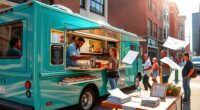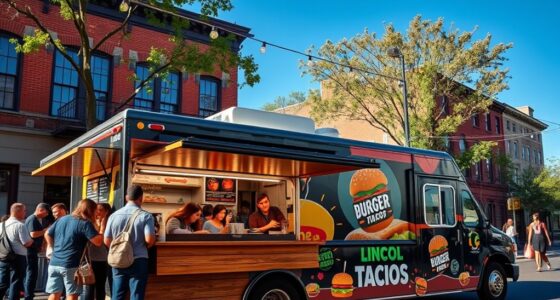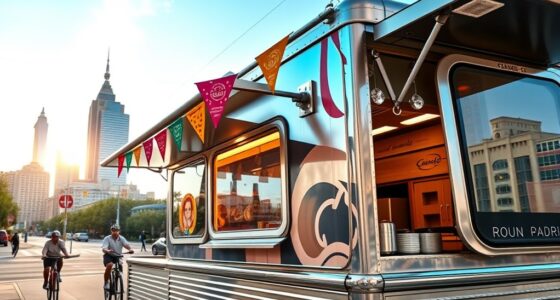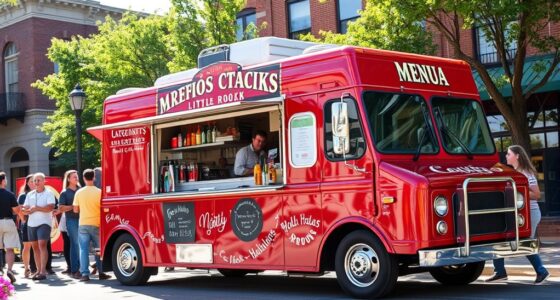To start a food truck in Colorado Springs, you’ll need to secure permits from city and state agencies, set up a compliant kitchen, and follow sanitation and parking regulations. Budget for vehicle costs, insurance, and menu items, then consider financing options or grants. Design a vibrant menu and use technology like contactless payments to streamline sales. Building your brand on social media and participating in local events can boost your success—keep exploring to learn more details.
Key Takeaways
- Obtain necessary permits and licenses from Colorado Springs city and state agencies, including health and vehicle registration.
- Develop a compliant kitchen setup, possibly through shared licensing, ensuring sanitation and safety standards are met.
- Budget for vehicle purchase, branding, equipment, and insurance, and explore local grants or funding options for startups.
- Design an attractive menu with flexible pricing, incorporating diverse options to appeal to Colorado Springs’ vibrant food scene.
- Build a strong brand presence using eye-catching truck design, active social media marketing, and participation in local food events.
Starting a Food Truck in Colorado
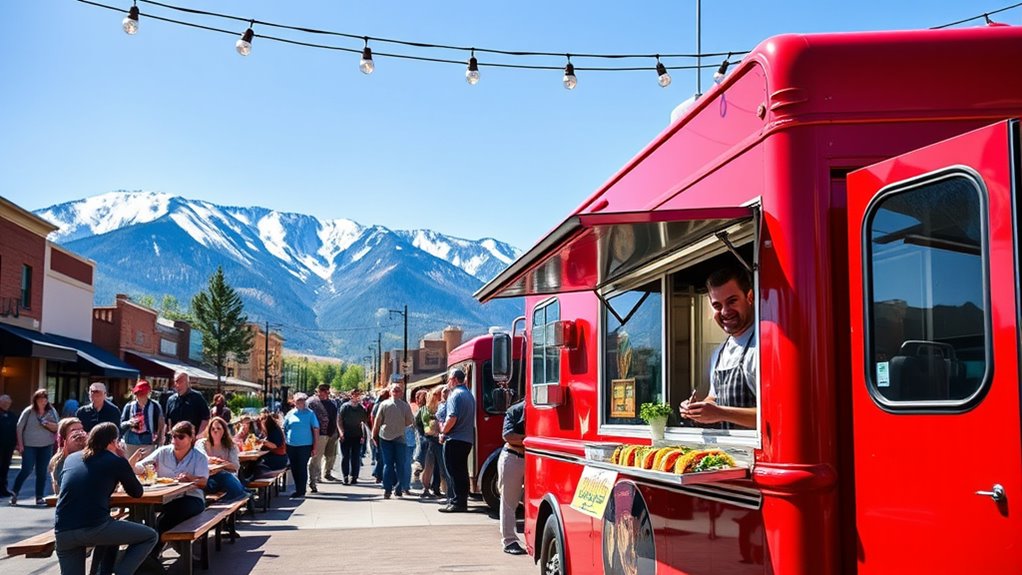
Are you ready to turn your culinary dreams into a mobile reality? Starting a food truck in Colorado involves more than just great food; it’s about establishing a strong food truck branding that catches eyes and attracts customers. Think about your truck’s design, logo, and overall look—these visuals will make your business memorable. Once you’ve nailed your branding, leverage social media marketing to build buzz before launching. Share your journey, menu updates, and location schedules to engage potential customers. Consistent online presence helps you create a loyal following and increases visibility in Colorado Springs. Incorporating visual and auditory cues into your marketing materials can further enhance customer engagement. With a clear brand identity and active social media efforts, you’ll set a solid foundation for your food truck’s success right from the start.
Understanding Local Requirements
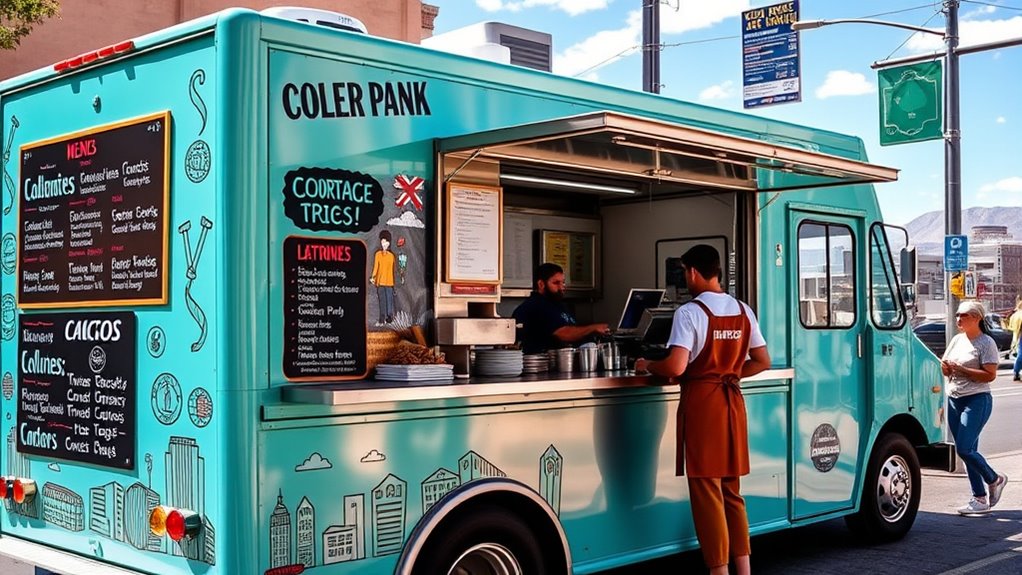
To operate a food truck in Colorado Springs, you need to understand the local requirements, starting with applying for the proper permit. You’ll also want to familiarize yourself with sanitation protocols and what inspectors look for to stay compliant. Additionally, knowing where you can park on designated streets keeps your business running smoothly and within the law.
Applying for Colorado Food Truck Permit
Applying for a food truck permit in Colorado Springs involves understanding and meeting specific local requirements set by city and state agencies. The permit application process requires you to gather necessary documents, such as proof of insurance, business registration, and vehicle details. You’ll also need to complete the licensing process through the Colorado Department of Revenue and the local health department. These agencies review your application to ensure compliance with safety, health, and zoning regulations. Be prepared for potential fees and inspections as part of the approval process. Staying organized and attentive to each step helps streamline your permit approval, preventing delays. By thoroughly understanding the application procedures and requirements, you’ll be well on your way to legally operating your food truck in Colorado Springs.
Sanitation Protocols and Inspection Tips
Understanding local sanitation requirements is essential for passing inspections and operating your food truck legally in Colorado Springs. You must prioritize food safety by following strict hygiene standards to prevent cross-contamination and ensure customer health. Regularly clean and sanitize all surfaces, utensils, and equipment according to local guidelines. Keep your food storage areas organized and at appropriate temperatures to inhibit bacterial growth. During inspections, be prepared to demonstrate your sanitation routines and maintain detailed logs. Remember, compliance isn’t just about passing inspection; it’s about building trust with your customers through consistent hygiene practices. Stay updated on Colorado Springs’ specific food safety regulations and ensure your team is trained to follow these protocols diligently. This approach will keep your food truck running smoothly and legally.
Designated Street Parking Zones
Finding your way through street parking regulations in Colorado Springs is key to keeping your food truck compliant and operational. You need to understand designated street parking zones to avoid parking tickets and disruptions. Local parking enforcement strictly monitors these zones, so always check street signage for specific restrictions and hours. Some areas may have time limits or permit requirements that you must follow. Look for clearly marked zones that allow food trucks and ensure you’re parked legally. Ignoring street signage or parking enforcement notices can lead to fines or towing, which disrupts your business. Familiarize yourself with the designated zones and plan your parking accordingly. Staying within these zones not only keeps your operations smooth but also shows respect for local regulations and helps you avoid penalties.
Setting Up Your Base of Operations
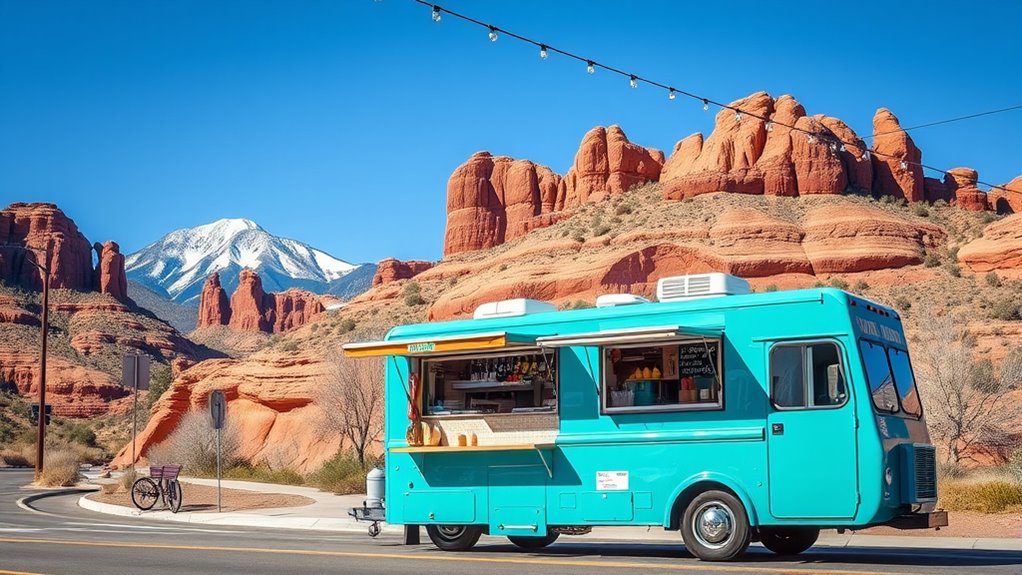
You need to choose the right space to operate your food truck, and shared kitchen licensing options can be a smart solution. Planning a custom kitchen layout guarantees your setup meets all health and safety standards while maximizing efficiency. Consider your specific menu and workflow to create a functional, compliant base of operations. Additionally, understanding cookie and privacy policies can help you manage your online presence and customer interactions more effectively.
Shared Kitchen Licensing Options
Setting up a shared kitchen can be a practical and cost-effective way to get your food truck operation off the ground in Colorado Springs. Shared kitchen licensing allows you to operate within a commercial kitchen that meets local commercial kitchen regulations, saving you the cost of building your own facility. These kitchens are licensed and inspected by health authorities, ensuring you meet all safety standards. Using a shared kitchen simplifies compliance because you’ll have access to already approved facilities, reducing the paperwork and delays associated with licensing. It’s an excellent option if you’re starting small or testing new menu ideas. Just make sure the shared kitchen you choose aligns with Colorado Springs’ commercial kitchen regulations, so your food truck can operate smoothly and legally.
Custom Kitchen Layout Planning
Designing your kitchen layout is a crucial step in establishing an efficient and compliant food truck operation. A well-planned layout enhances kitchen ergonomics, reduces movement, and boosts layout efficiency. Start by arranging stations logically—prep, cook, and serve—to minimize unnecessary steps. Use the table below to visualize key areas:
| Station | Essential Equipment | Space Considerations |
|---|---|---|
| Prep Area | Cutting boards, sinks | Close to storage |
| Cooking Area | Grills, fryers, ovens | Adequate ventilation |
| Service Zone | Serving counters, POS | Easy customer access |
| Storage | Shelving, refrigeration | Near prep area |
Prioritize flow, safety, and accessibility. Proper layout ensures smooth operations and compliance.
Budgeting and Financing Your Food Truck

Budgeting for your food truck starts with understanding the initial vehicle costs and how much you need to invest upfront. You should also explore startup grants available in Colorado Springs that can help ease your financial burden. Additionally, securing liability coverage is essential to protect your business and manage potential risks effectively. Embracing failure as a learning opportunity can also be valuable when navigating the financial aspects of starting a food truck, as setbacks often lead to innovative solutions and resilience.
Initial Vehicle Purchase Costs
Purchasing your food truck is a significant upfront investment that requires careful planning. Initial vehicle costs vary based on size, condition, and customization, impacting your overall budget. Keep in mind that vehicles typically experience vehicle depreciation over time, which affects their resale value. To manage costs, explore different financing options, such as loans or leasing, to spread payments out and preserve cash flow. When budgeting, consider these factors:
- Purchase price of new or used trucks
- Customization and equipment costs
- Financing options and interest rates
- Expected vehicle depreciation over years
Being aware of these costs helps you make informed decisions and plan for the long-term success of your food truck. Proper budgeting ensures you avoid surprises and stay financially grounded.
Startup Grants for Food Trucks
Securing startup grants can be a valuable way to offset the costs of launching your food truck, especially when upfront capital is limited. These grants can help cover expenses like vehicle branding, equipment, and initial inventory, giving you more flexibility to focus on building customer loyalty. Research local, state, and federal grants aimed at small businesses or food entrepreneurs in Colorado Springs. Some grants specifically support food truck startups, offering funding for branding and marketing efforts. Consider applying for community development grants or small business innovation programs. Here’s a quick overview:
| Grant Type | Focus Area | Eligibility |
|---|---|---|
| Small Business Grants | Food truck branding and marketing | Colorado Springs startups |
| Community Development | Local economic growth | Small business owners |
| Innovation Grants | Unique food concepts | Entrepreneurs with new ideas |
Liability Coverage for Food Trucks
Since liability coverage is essential for protecting your food truck business, understanding its costs is a critical part of your budgeting and financing strategy. Liability coverage helps shield you from costly claims related to accidents, injuries, or property damage. The insurance requirements for food trucks vary, but most places, including Colorado Springs, mandate minimum coverage levels. Expect to pay between $1,000 and $4,000 annually, depending on coverage limits and your specific risks. To keep costs manageable, compare quotes from multiple providers and consider bundling with other coverage. Remember, neglecting proper liability coverage can lead to significant financial setbacks. Being well-informed on insurance requirements guarantees you’re protected and compliant, giving you peace of mind to focus on growing your food truck business.
Designing Your Menu and Pricing Strategy
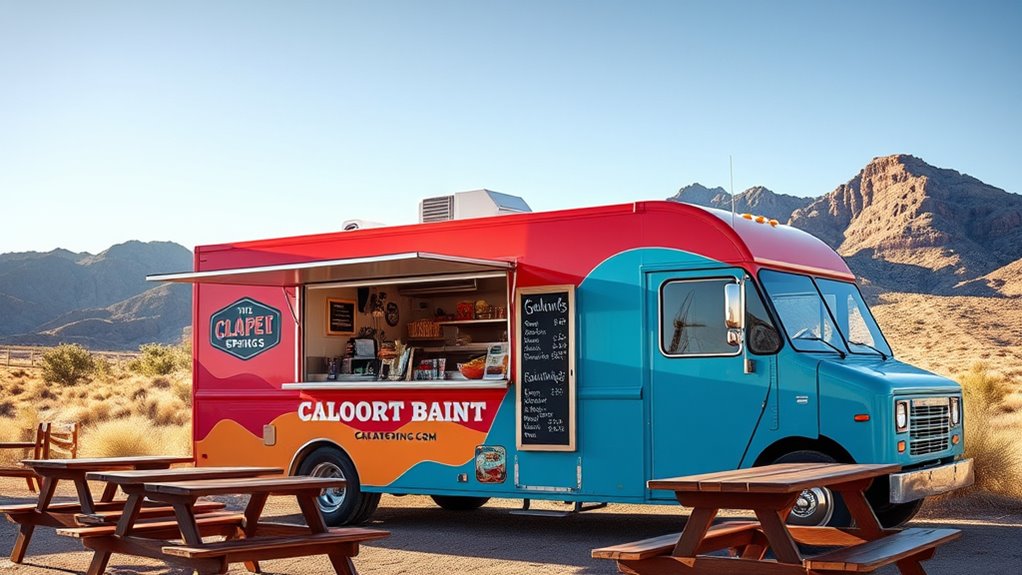
When designing your menu, consider offering dishes that appeal to a variety of tastes to attract a broader customer base. You should also develop a pricing strategy that adjusts based on demand, maximizing profits during busy times. By balancing diverse options with flexible pricing, you can keep customers happy and your business thriving. Incorporating aesthetic wall organization ideas can also help create an inviting and well-organized space that enhances the overall customer experience.
Crafting Dishes for Diverse Palates
Designing a menu that appeals to a wide range of tastes requires careful consideration of both dish selection and pricing. To do this, focus on creating dishes with balanced flavor pairing and appealing food presentation. This approach guarantees your offerings attract diverse customers. Consider these tips:
- Offer variety, from vegetarian options to hearty meats, to cater to different preferences
- Use vibrant, appealing food presentation to make dishes stand out visually
- Experiment with flavor pairing to create unique and memorable tastes
- Price items strategically to balance affordability with perceived value
Dynamic Pricing Based on Demand
A flexible pricing strategy that responds to demand can substantially boost your food truck’s profitability and customer satisfaction. Dynamic pricing allows you to adjust prices based on real-time demand, making your demand-based strategies more effective. During peak hours or special events, increase prices slightly to maximize revenue without alienating customers. Conversely, offer discounts during slow periods to attract traffic. By implementing demand-based strategies, you can better manage supply and demand, ensuring your truck remains competitive and profitable. Keep an eye on customer flow and sales data to refine your dynamic pricing approach continually. This adaptability not only enhances your income potential but also shows customers you’re attentive to their needs, encouraging loyalty and positive reviews.
Technology and Operations
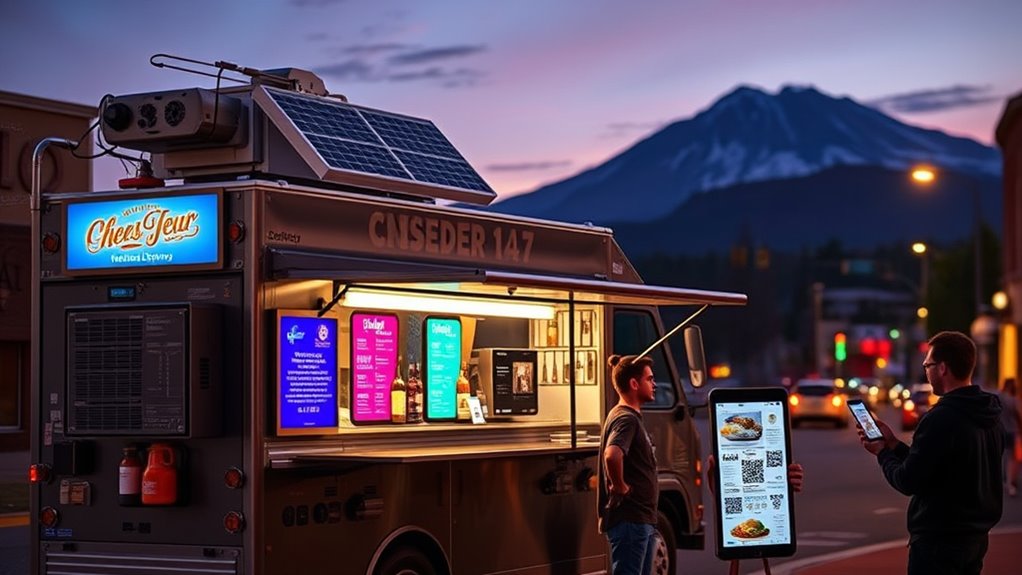
You can streamline your operations with contactless payment options, making transactions faster and safer for customers. Real-time stock tracking software helps you stay on top of inventory, reducing waste and ensuring freshness. Incorporating these technologies keeps your food truck efficient and competitive in Colorado Springs. Paying attention to color accuracy can also enhance your branding visuals and signage, attracting more customers.
Contactless Payment Options Available
Have you noticed how many food trucks now accept contactless payments? It’s become a game-changer for both operators and customers. With contactless payments, you can streamline sales and reduce cash handling, making transactions quick and secure. Plus, mobile ordering options allow customers to place orders ahead, minimizing wait times.
Here are some benefits:
- Faster checkout process
- Improved hygiene and safety
- Enhanced customer experience
- Increased sales opportunities
Embracing contactless payments means you stay competitive and cater to tech-savvy customers. Integrating mobile ordering and contactless payment systems can boost your efficiency and grow your business in Colorado Springs. It’s a smart move for any food truck owner looking to modernize operations and satisfy customer preferences.
Real-Time Stock Tracking Software
Implementing real-time stock tracking software can substantially enhance your food truck’s efficiency by providing instant updates on inventory levels. With real-time inventory management, you’ll know exactly what ingredients are running low, preventing shortages during busy hours. This technology streamlines stock management, allowing you to avoid overstocking or waste. By automatically tracking sales and stock movements, you gain better control over your supplies. Real-time data helps you make informed purchasing decisions, saving money and reducing spoilage. Plus, it simplifies inventory audits and reduces manual counting errors. Integrating this software ensures your stock is always accurately monitored, so you can focus on serving customers without the stress of stockouts or excess inventory. Ultimately, it keeps your food truck running smoothly and efficiently.
Marketing and Growing Your Presence
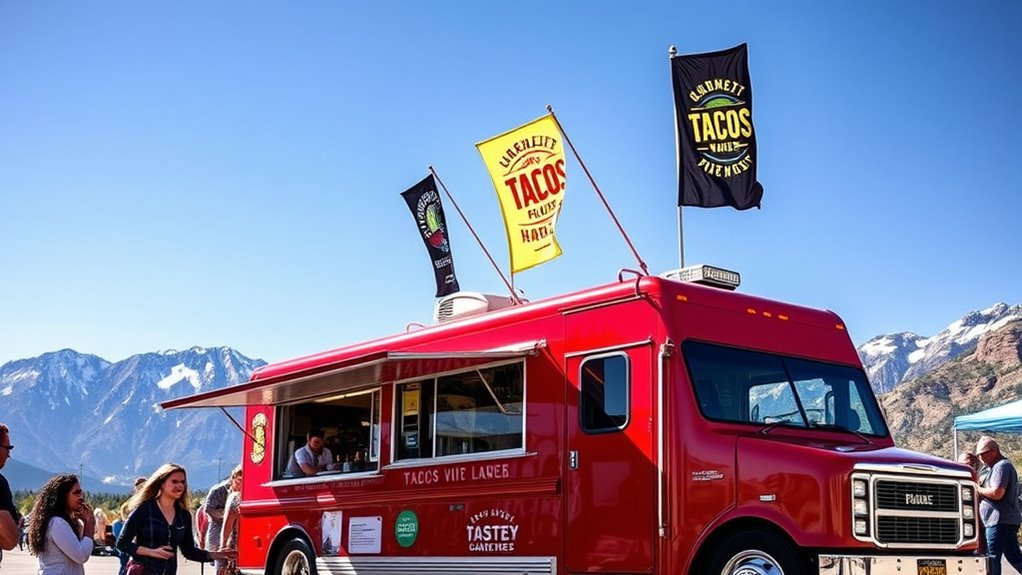
To boost your food truck’s visibility, focus on targeting popular event locations and prime times when crowds gather. Sharing eye-catching, mouth-watering photos on Instagram can also attract new customers and build your brand. Consistently engaging with your audience helps grow your presence and keeps people coming back for more.
Popular Event Locations and Times
Choosing the right event locations and times is essential for boosting your food truck’s visibility in Colorado Springs. Focus on popular spots like food truck festivals, farmers markets, downtown events, and outdoor concerts. These venues attract large crowds enthusiastic to try new flavors. Timing is equally important—consider attending during peak hours or weekends when foot traffic peaks. Planning your seasonal menu around upcoming festivals and local events keeps your offerings relevant and appealing. Additionally, coordinating with event organizers can secure prime spots and ideal hours. Keep your schedule flexible to capitalize on spontaneous opportunities. Remember, consistent presence at high-traffic events builds your reputation and customer loyalty, helping your food truck thrive in Colorado Springs.
Engaging Instagram Food Photos
Capturing eye-catching food photos on Instagram is essential for building your food truck’s online presence in Colorado Springs. Focus on food styling to make each dish look irresistible—use vibrant colors, appealing plating, and natural lighting. Once you’ve snapped the perfect shot, leverage photo editing tools to enhance brightness, contrast, and sharpness, ensuring your images pop. Consistent, high-quality photos attract followers and encourage engagement. Remember, authentic and appetizing visuals tell your story and showcase your menu’s best features. Incorporate trending hashtags and geotags to reach local audiences. By mastering food styling and photo editing, you’ll transform simple images into powerful marketing tools that grow your presence and attract hungry customers to your food truck.
Colorado Springs Culinary Scene
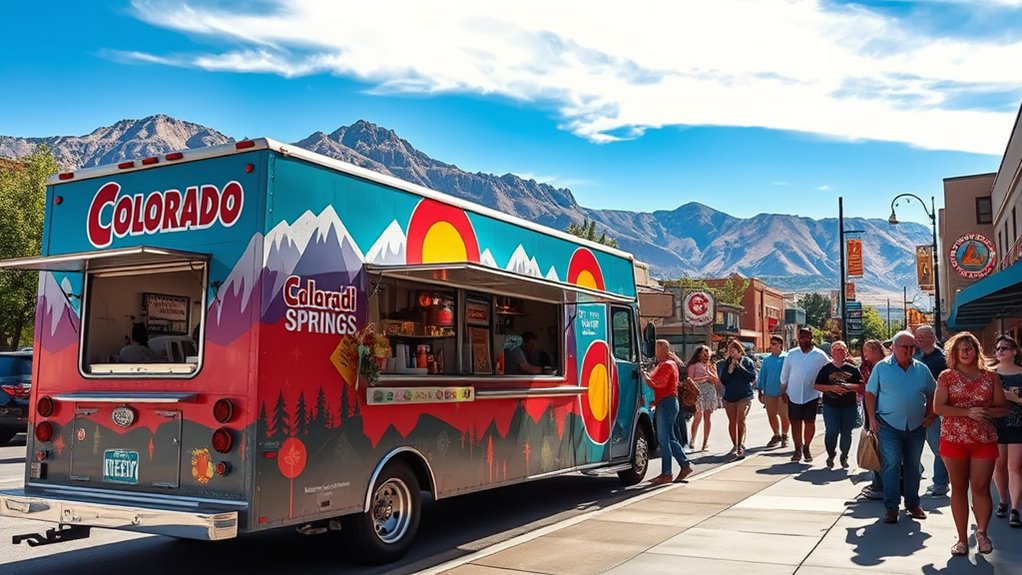
The Colorado Springs culinary scene thrives on its vibrant mix of innovative restaurants, farmers’ markets, and food trucks that bring diverse flavors to the community. You’ll find exciting events like local food festivals that showcase regional ingredients and creative dishes. Chef collaborations are common, blending different cuisines and inspiring new flavors for food truck menus. This lively environment encourages you to experiment with unique concepts and connect with passionate chefs. As a food truck owner, you can tap into this energetic scene by participating in community events or partnering with local artisans. The scene’s diversity guarantees there’s always something new to explore, making Colorado Springs an ideal place to launch your culinary journey. Embrace the buzz and bring your unique flavor to this thriving community.
Frequently Asked Questions
What Are the Best Locations to Park My Food Truck in Colorado Springs?
You should park your food truck in popular local spots like downtown Colorado Springs, near the Broadmoor, or at busy food truck parks. Look for designated food truck parking zones, especially during events or weekends, to attract more customers. Parks, farmers markets, and near popular local spots like the Colorado Springs Pioneers Museum also draw crowds. Always check local regulations and get necessary permits before parking.
Are There Any Specific Health and Safety Regulations Unique to Colorado Springs?
You need to prioritize health code compliance and safety inspection requirements in Colorado Springs. While regulations align with state standards, some local ordinances may have unique aspects, like specific permits or parking restrictions. It’s wise to confirm with the Colorado Springs health department to ensure you’re meeting all safety standards. Investigating local rules helps prevent issues and keeps your food truck operating smoothly and safely in the community.
How Do I Find Reliable Suppliers and Vendors in the Area?
You find reliable suppliers and vendors in Colorado Springs by building strong vendor relationships and prioritizing local sourcing. Visit farmers’ markets, join local business groups, and attend food industry events to connect with trusted vendors. Ask for references, check reviews, and sample their products to guarantee quality. Developing these relationships helps you secure consistent, fresh ingredients and supplies, giving your food truck a competitive edge in the community.
What Permits or Licenses Are Required for Special Events or Festivals?
For special events or festivals, you need event insurance to protect your truck and liability. You’ll also require vendor contracts outlining responsibilities, payments, and setup times. Check with event organizers for specific permit requirements, which may include health permits, food handler’s licenses, and temporary food service permits. Ensuring you have the right insurance and contracts in place helps you comply with local regulations and protects your business during these events.
How Can I Connect With the Local Food Truck Community in Colorado Springs?
To connect with the local food truck community, immerse yourself in social media networking and join local food festivals. Follow Colorado Springs food truck pages and engage with posts to build relationships. Attend community events regularly, introduce yourself, and share experiences. Participating actively helps you gain visibility and partnerships. Remember, genuine connections open doors, so be approachable and enthusiastic about collaborating with others in the vibrant Colorado Springs food scene.
Conclusion
Starting your food truck in Colorado Springs is an exciting journey. Did you know that the food truck industry has grown over 8% annually nationwide? With the city’s vibrant culinary scene and passionate community, your venture can thrive. By understanding local regulations, crafting a unique menu, and leveraging effective marketing, you set yourself up for success. Get ready to serve up delicious experiences and build a loyal following in this dynamic city!

